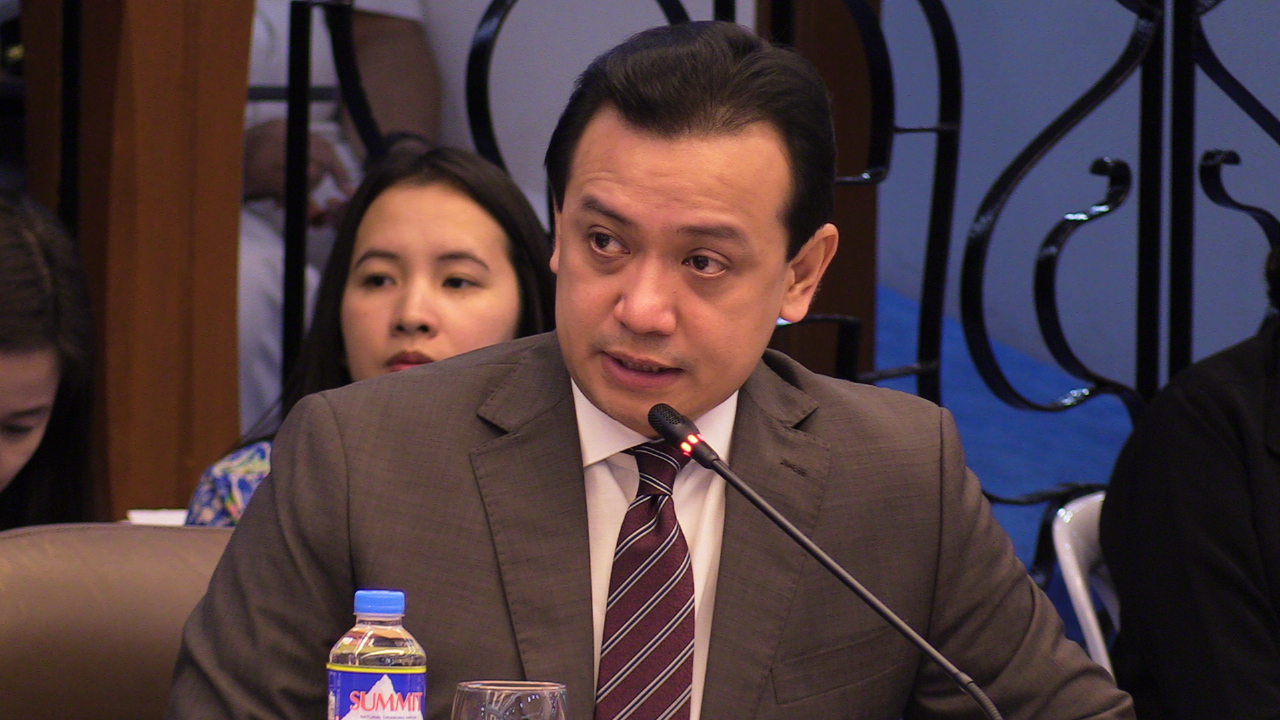
Sen. Antonio Trillanes IV. INQUIRER.net / CATHY MIRANDA
After an almost eight-hour hearing, which included a cross-examination of witnesses from both camps, Judge Andres Soriano of Makati City Regional Trial Court (RTC) Branch 148 still did not issue a warrant of arrest against Sen. Antonio Trillanes IV on Friday.
Soriano instead asked the senator’s camp to file its formal offer of evidence on Tuesday next week, while the prosecution was given a day to file their comment. Only then will the judge decide whether to order Trillanes’ arrest for leading a coup d’etat against then President Gloria Macapagal-Arroyo.
During the hearing, two prosecution witnesses admitted that all the records, minutes and other documents related to the amnesty given to Trillanes and 276 other mutineers under President Aquino’s Proclamation No. 75 were missing from the archives of the Department of National Defense (DND).
Norman Daanoy, chief of legal affairs at the DND, and DND head of records Arlene Manjares said the records could not be found in their respective offices.
Daanoy said he had asked the offices of the undersecretary for national defense, undersecretary for security policy, and assistant secretary for human resources regarding the amnesty documents, and that their response was “negative.”
Certification
On Sept. 21, the DND Legal Affairs Office submitted a letter to the Department of Justice stating that based on records, there are no available documents, transcript of stenographic notes and minutes of deliberation related to the amnesty proclamation.
Another prosecution witness, Lt. Col. Thea Joan Andrade maintained that Trillanes’ amnesty application form could not be found in the Office of the Deputy Staff for Personnel, or J1, the Armed Forces of the Philippines’ repository of documents.
Finger-pointing
It was Andrade’s certification that became one of the bases of Mr. Duterte’s Proclamation No. 572, declaring Trillanes’ amnesty as being void from the start because he could not present the original copy of his application.
Upon questioning by Trillanes’ counsel Rey Robles, Andrade admitted that she was assigned to JI only in 2012 and had no knowledge whether the senator had filed his amnesty application in 2011.
Witnesses for the Trillanes camp—Col. Josefa Berbigal, the former head of the secretariat, and Honorio Azcueta, the former defense undersecretary and amnesty ad hoc committee chair—pointed fingers as to who was the last custodian of Trillanes’ amnesty records.
Both Berbigal and Azcueta, however, reiterated before the court that Trillanes had filed his amnesty application, and that it was Berbigal who received the application form on Jan. 5, 2011, at the AFP headquarters in Camp Aguinaldo.
Berbigal said she could “well remember” that Trillanes admitted guilt of his crime because “I emphasized to him that it was a requirement of the amnesty.”
She noted that admission of guilt was already part of the application form, as well as the recantation of previous statements inconsistent with the admission.
‘Defective’
Acting Prosecutor General Richard Fadullon, however, said that “the form itself was defective and could have been corrected, had the [Trillanes camp] shown that there was really an admission.”
Robles refuted this.
“The ad hoc committee was satisfied (with) Trillanes’ admission of guilt in his application. You cannot just decide that you want to change it after seven years,” the lawyer said. “The interpretation of the committee should be treated with respect,” he added.
P200,000 bail
On Sept. 25, Judge Elmo Alameda of Makati RTC Branch 150 issued an arrest warrant against the senator and reopened the rebellion case against him based on President Duterte’s Proclamation 572, which voided the amnesty granted by then President Benigno Aquino III to Trillanes.
Alameda, however, allowed the senator to post a P200,000 bail.
Should Soriano order his arrest, Trillanes would be detained at the custodial center of the Philippine National Police at Camp Crame in Quezon City.